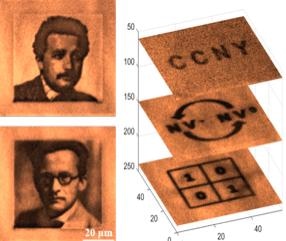Oct 27 2016
In the world of big data, there are limitations on storing large volumes of information. Typical home-computer hard disk drives use up a lot of power and are limited to a few terabytes per drive. Optical storage media such as Blu-ray and DVD, are energy efficient and inexpensive, however storage densities are very low because of the optical diffraction limit and planar nature of the discs. However, scientists have made progress on creating a 3D diamond chip capable of storing vastly more data compared to existing technologies.
 This figure shows a demonstration of rewritable 3D optical data storage in diamond. (Credit - Meriles Group, City College of the City University of New York)
This figure shows a demonstration of rewritable 3D optical data storage in diamond. (Credit - Meriles Group, City College of the City University of New York)
A team of physicists belonging to the group of Prof. Carlos Meriles at City College of the City University of New York (CUNY) are keen on circumventing data storage limits by making use of the charge state and spin properties of the Nitrogen-Vacancy (NV) center in diamond. The details of their work have been published in the Science Advances journal.
The team has devised a memory bit without a diffraction-limited bump on the surface of a DVD, but instead with an atomic-sized defect capable of trapping and releasing electrons when required with laser excitation.
As confirmation of principle, the Meriles Group used optical microscopy to read, write and reset data in a diamond crystal with a 2D bit density comparable to existing DVD technology. The crystal, in this case, is equal to a rewritable memory storage device with virtually zero data degradation with time, if placed in the dark. The researchers also provided a way to expand the storage capacity to three-dimensions without upsetting the written data already present. They also showed that it is possible to manipulate the spin degree of freedom, unique to this system, with the help of precisely shaped multi-color beams and radio-frequency sources to realize bit sizes much smaller than the optical diffraction limit. The ensuing storage densities for this sort of diamond chip would be hundreds of thousands of times larger than current Blu-ray technology.
This work reveals a unique opportunity of utilizing atomic sized defects for high density data storage, transforming the beauty of physics into a vastly useful technology.
Dr. Siddharth Dhomkar, Post-doctoral Associate in the Meriles Group.
Speaking about the real-world practicality of their innovation for the future, Mr. Jacob Henshaw, co-first author and PhD student in the Meriles Group, said, "This proof of principle work shows that our technique is competitive with existing data storage technology in some respects, and even surpasses modern technology in terms of re-writability. You can charge and discharge these defects a practically unlimited number of times without altering the quality of the material."
"[I]n principle, their technique could achieve higher information densities by encoding binary (classical) information (as opposed to quantum information) on the spin, rather than the charge, of NV centers," said Dr. Marcus Doherty, Postdoctoral Fellow at the Laser Physics Centre, Research School of Physics an Engineering, Australian National University, who was not involved with the CUNY study. "This is an exciting instance where the quest for next paradigm quantum technologies has yielded a novel advance in today's classical technologies."
The diamond chip is still in the premature stages of development. But Dr. Doherty highlights the fact that progress in super-dense data storage, like those achieved by the Meriles Group, are required to sustain the growing amounts of data processed by high performance computers in pursuit of scientific investigations, such as gravitational wave modeling in reconstruction of complex biomolecules, astrophysics, and climate change simulations.